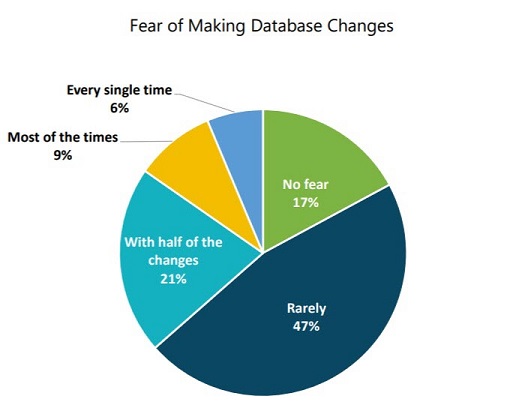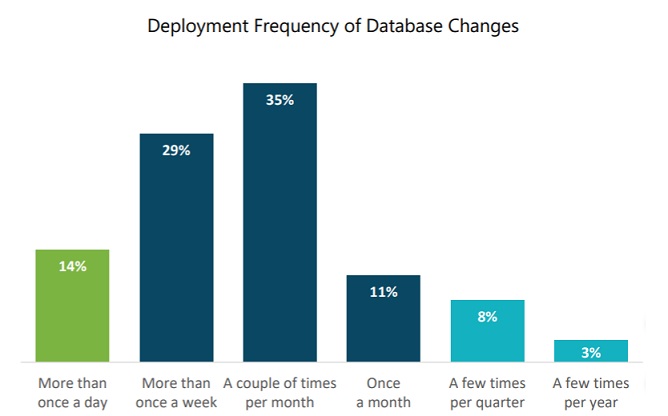SmartBear announced a new version of its API design and documentation tool, SwaggerHub, integrating Stoplight’s API open source tools.
When was the last time your company experienced a significant database error? If it happened in the last 3 months, you’re in good company. A recent study conducted by DBmaestro asked 244 IT professionals this very question; 60% of respondents reported a crash or significant database error occurring in the last 6 months. Roughly one in ten respondents reported a serious database problem in the past week.
The survey, conducted online in October, sheds light on common practices in database management, errors and risks, as well as the rate of adoption of DevOps practices throughout all R&D functions. The results show that while DevOps practices have been widely adopted and utilized in application development, databases have been left behind. Crashes and major errors are prevalent among respondents, and even more so among companies that attempt to push database changes often.
Database Errors are Costly, Frequent, Dreaded
Database errors can be expensive; estimates vary, but studies show that an hour of database downtime can cost your business anywhere from $100,000 to $600,000+ an hour. These estimates have been growing steadily in the last several years, and can be even bigger for companies that rely heavily on timely database data retrieval for business operations.
While there can be many different causes for serious database errors, the 2018 Database Devops Survey reveals that the top causes are accidental overrides, invalid code and conflicts between teams. These three horsemen of the apocalypse account for over 50% of major database errors, respondents report.
For these reasons, it comes as no surprise that pushing changes to the database involves dread. In fact, over one-third of respondents reported that they are anxious about pushing database changes at least half the time.

DevOps Practices Used Widely – But Not for Databases
The fear-inducing errors that lead to crises when pushing new changes have all long been solved in the world of code development. With the extensive adoption of DevOps practices across multiple industries, similar errors in application development have been reduced to nothing. In fact, when asked about continuous delivery practices, 54% of respondents report that they are fully implemented in at least half of the company’s application development projects.
Adoption of these practices for the database is slow and lagging, the report shows. Only 36% of respondents report that they've implemented continuous delivery practices for database changes. On top of that, most respondents report that only the DBAs are allowed to push changes, often making them a bottleneck in the process.
It comes as no surprise that the result is slow, infrequent changes deployed to the database. Almost half (46%) of respondents reveal that they are only able to deploy database changes once or twice a month, a fact that stands in stark contrast to environments where CI/CD practices enable multiple deployments daily. In fact, only 14% of respondents currently have that capacity for database deployments.

Onward and Upward
The bottom line is clear: database needs to hop on the DevOps bandwagon, and fast. The only way to eliminate and prevent major database errors is by automating processes and adopting continuous delivery practices, stat. In turn, this will also improve the ability to push database changes often and fast, making the database as agile as any other part of the company’s development process.
Industry News
Red Hat announced updates to Red Hat Trusted Software Supply Chain.
Tricentis announced the latest update to the company’s AI offerings with the launch of Tricentis Copilot, a suite of solutions leveraging generative AI to enhance productivity throughout the entire testing lifecycle.
CIQ launched fully supported, upstream stable kernels for Rocky Linux via the CIQ Enterprise Linux Platform, providing enhanced performance, hardware compatibility and security.
Redgate launched an enterprise version of its database monitoring tool, providing a range of new features to address the challenges of scale and complexity faced by larger organizations.
Snyk announced the expansion of its current partnership with Google Cloud to advance secure code generated by Google Cloud’s generative-AI-powered collaborator service, Gemini Code Assist.
Kong announced the commercial availability of Kong Konnect Dedicated Cloud Gateways on Amazon Web Services (AWS).
Pegasystems announced the general availability of Pega Infinity ’24.1™.
Sylabs announces the launch of a new certification focusing on the Singularity container platform.
OpenText™ announced Cloud Editions (CE) 24.2, including OpenText DevOps Cloud and OpenText™ DevOps Aviator.
Postman announced its acquisition of Orbit, the community growth platform for developer companies.
Check Point® Software Technologies Ltd. announced new email security features that enhance its Check Point Harmony Email & Collaboration portfolio: Patented unified quarantine, DMARC monitoring, archiving, and Smart Banners.
Automation Anywhere announced an expanded partnership with Google Cloud to leverage the combined power of generative AI and its own specialized, generative AI automation models to give companies a powerful solution to optimize and transform their business.
Jetic announced the release of Jetlets, a low-code and no-code block template, that allows users to easily build any technically advanced integration use case, typically not covered by alternative integration platforms.
Progress announced new powerful capabilities and enhancements in the latest release of Progress® Sitefinity®.




